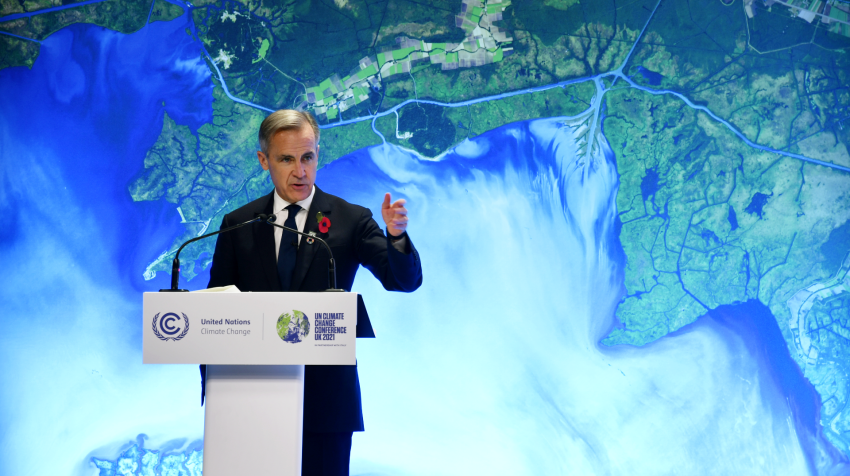Focus on finance
World leaders have left Glasgow. Attention at COP26 turned to the specifics of moving the climate action agenda, with a focus on how to finance the transition to a greener future. The issue of finance is all encompassing. There is much concern over the failure of developed countries to meet their promise to provide $100 billion a year to help developing countries finance climate mitigation and adaptation. At the same time, there is a broader effort to mobilize vast amounts of private investment globally behind low-carbon and eventually no-carbon growth.
We have the funds
At the opening of the COP26 Finance Day, the Glasgow Financial Alliance for Net Zero announced it had mobilized over 450 firms from 45 countries to commit to transforming economies towards net-zero emissions. The firms collectively control over $130 trillion in private capital. British Chancellor Rishi Sunak said the assets would be aligned with Paris Agreement goals, including limiting global warming to 1.5C.
UN Special Envoy for Climate Action and Finance Mark Carney called it a “watershed” moment. “Up until today there was not enough money in the world to fund the transition,” he said. “Right here, right now is where we draw the line. The $130 trillion is more than is needed for the net-zero transition globally.” He added that a pool of that capital will be carved out for transitions in emerging and developing economies.
Partners support South Africa’s shift from coal
To help South Africa move away from coal as it decarbonizes its energy sector, a new partnership of France, Germany, the United Kingdom, the United States and the European Union announced it will mobilize an initial $8.5 billion in grants, concessional loans, investments and risk-sharing instruments. The partnership is expected to prevent up to 1-1.5 gigatons of emissions over the next 20 years and jumpstart South Africa’s move to a low-emission, climate-resilient economy.
South Africa President Cyril Ramaphosa said, “We look forward to a long-term partnership that can serve as an appropriate model of support for climate action from developed to developing countries, recognizing the importance of a just transition to a low-carbon, climate-resilient society that promotes employment and livelihoods.”
A just transition: Show us the plan
A shift from fossil fuels is imperative to tackle climate change. Also essential is to anticipate and moderate potential impacts on the world’s 3.3 billion workers. “If you close a coal plant or a refinery, it is not easy for workers to find the same job. So, what are the plans? We need transparency,” said Diana Junquera Curiel from the Industrial Global Union. International Trade Union Confederation head Sharan Burrow stressed “quality jobs, just wages and a seat at the table” for employees.
The transition to a low-carbon economy will generate new opportunities for work, creating an estimated 65 million new jobs by 2030. The fastest growth in employment will be in solar, wind and geothermal energy.
Hunger is the face of the climate crisis
A shocking 42 million people stand on the brink of hunger, according to World Food Programme official Gernot Laganda. “The face of climate change is the face of hunger,” he said. Climate impacts have forced 30 million people to leave their homes, more than those uprooted by conflict.
Laganda pointed to solutions demanding more attention and support. In Bangladesh, cash provided to people before monsoon flooding reduced the number of people with nothing to eat by 36 per cent. In Africa, climate risk insurance has helped 2.1 million people sustain their lives and livelihoods, including 65,000 in Malawi who received payments after a failed growing season.
Better weather forecasts save lives
The World Meteorological Organization, in collaboration with other international entities, launched a new facility to support countries in generating and exchanging basic data to improve weather forecasts and climate services. The Systematic Observations Financing Facility will provide technical and financial assistance to strengthen climate adaptation and resilience, especially for the most vulnerable countries and peoples.
Credibility concerns
With all the announcements coming out at COP26, there are already concerns about follow-up. Will countries keep their word? Will companies deliver on their promises? Oxfam GB CEO Dhananjayan Sriskandarajah commented, “We are worried about the lack of real, tangible commitments. We haven’t seen sufficient ambition, (or) sufficient detail on how rich countries are going to deliver on their promises on cutting greenhouse gas emissions, (and) on delivering on the shortfalls of climate finance.”
Harjeet Singh from the Climate Action network asked, “How do I trust world leaders to adhere to commitments? We have to make sure that climate action is based on equity and justice. If there is no stream of finance provided to developing countries and vulnerable people, we will call COP26 a failure.”

